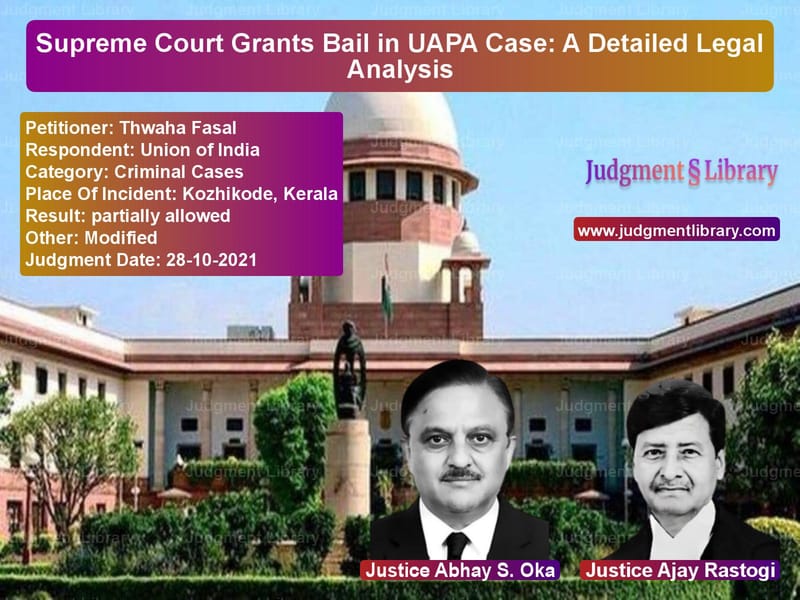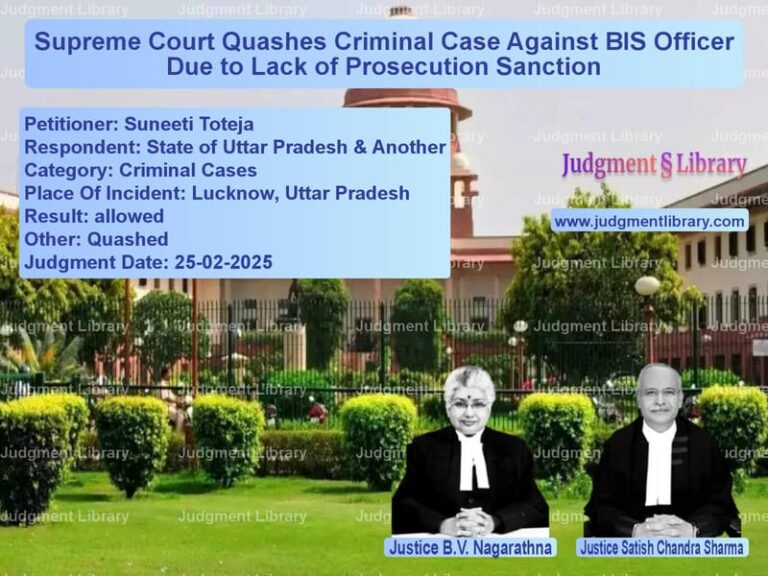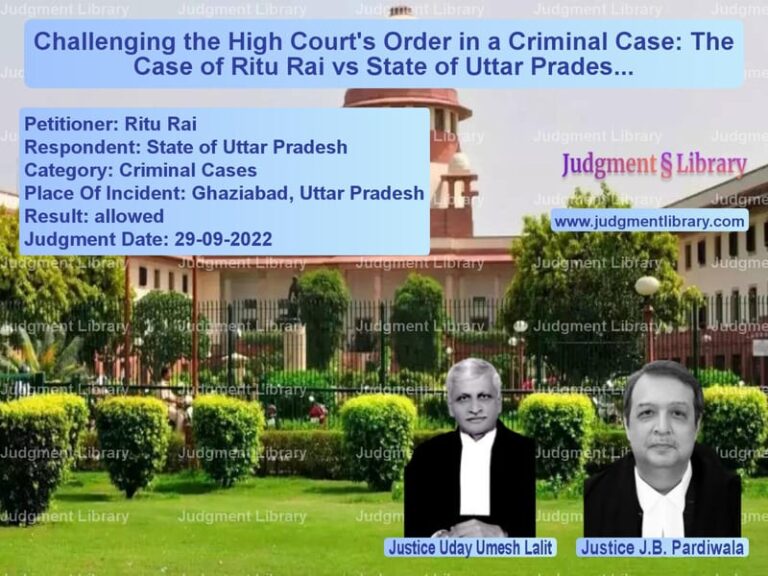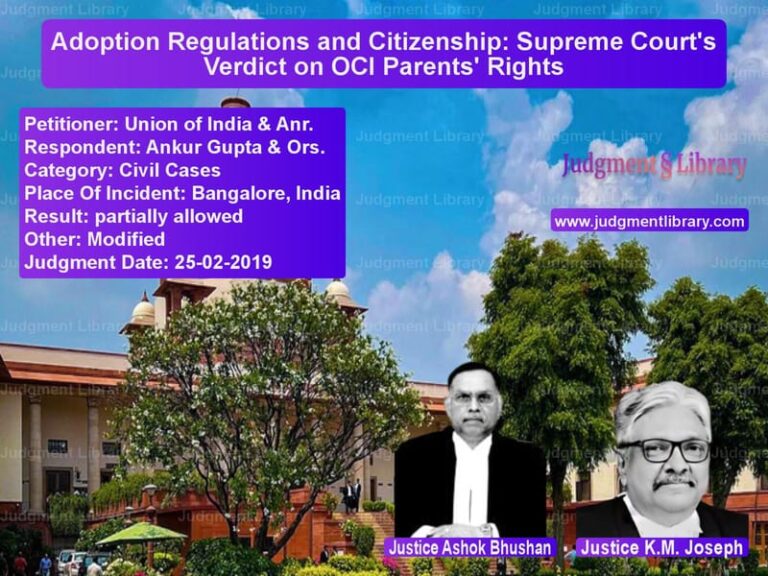Supreme Court Grants Bail in UAPA Case: A Detailed Legal Analysis
The Supreme Court of India, in a landmark judgment, addressed the interpretation of the stringent Unlawful Activities (Prevention) Act, 1967 (UAPA), while granting bail to two accused individuals—Thwaha Fasal and Allan Shuaib. The case involved the alleged membership of the Communist Party of India (Maoist), a banned organization under the UAPA.
This judgment is crucial because it sets a legal precedent regarding what constitutes an offense under UAPA, the burden of proof on the prosecution, and the principle that mere ideological alignment with a banned outfit does not automatically render an individual a terrorist. The Supreme Court’s ruling clarifies the scope of Section 43D(5) of UAPA, which imposes restrictions on granting bail in cases involving national security.
Background of the Case
On November 1, 2019, Kerala Police arrested three individuals, including Thwaha Fasal and Allan Shuaib, for allegedly possessing materials propagating Maoist ideology. The arrests were made in Kozhikode, Kerala, and an FIR was registered under Sections 20, 38, and 39 of UAPA, which deal with the membership, support, and funding of terrorist organizations.
Initially, the Kerala Police investigated the case, but later, the National Investigation Agency (NIA) took over, citing national security concerns. The accused filed for bail, which was granted by the Kerala High Court. However, the NIA challenged the order, arguing that the accused were active members of CPI (Maoist) and posed a threat to national security.
Key Legal Issues
The Supreme Court had to determine:
- Whether possession of literature related to CPI (Maoist) constituted an offense under UAPA.
- If the prosecution had provided prima facie evidence justifying denial of bail under Section 43D(5) of UAPA.
- Whether the accused were merely ideologically aligned or actively involved in promoting terrorism.
Petitioners’ Arguments
The accused, through their legal counsel, contended that:
- They were students and had no role in the activities of CPI (Maoist).
- Their arrest was based on the mere possession of Maoist literature, which does not amount to an offense.
- There was no evidence linking them to violent acts or terrorist activities.
- Section 43D(5) should not be applied unless there is substantive proof of criminal intent.
Respondent’s Arguments
The NIA opposed bail, arguing that:
- The accused possessed documents that promoted Maoist ideology.
- The possession of such literature proved their association with a banned terrorist organization.
- Granting bail in such cases could weaken anti-terror efforts.
Supreme Court’s Legal Analysis
1. Definition of Membership Under UAPA
The Supreme Court examined whether mere possession of Maoist literature equated to active membership in a banned organization. It observed:
“Mere possession of books related to Maoist ideology, without evidence of direct involvement in terrorist acts, is insufficient to attract Sections 38 and 39 of UAPA.”
2. Burden of Proof for Bail Under UAPA
The Court reaffirmed that for bail to be denied under Section 43D(5), the prosecution must establish that the allegations are prima facie true. It stated:
“The prosecution must show active participation or intent to further terrorist activities to deny bail under UAPA.”
3. Evaluation of Evidence
The Supreme Court found that:
- The prosecution had not presented direct evidence linking the accused to acts of terrorism.
- There was no proof that the accused were actively recruiting or funding terrorist activities.
- Merely holding radical literature does not satisfy the threshold for denial of bail.
Final Judgment and Conclusion
The Supreme Court ruled in favor of the accused and upheld their bail, stating that the NIA had failed to demonstrate their active participation in terrorism. The key takeaways from this ruling include:
- Mere ideological sympathy does not constitute an offense under UAPA.
- Bail under UAPA cannot be denied without substantive proof of intent.
- The judiciary must safeguard constitutional rights while ensuring national security.
This judgment reaffirms the principle that laws dealing with national security must be applied with caution and due process.
Judges: The judgment was delivered by Abhay S. Oka and Ajay Rastogi.
Petition Result: Partially Allowed
Petitioner Name: Thwaha Fasal.Respondent Name: Union of India.Judgment By: Justice Abhay S. Oka, Justice Ajay Rastogi.Place Of Incident: Kozhikode, Kerala.Judgment Date: 28-10-2021.
Don’t miss out on the full details! Download the complete judgment in PDF format below and gain valuable insights instantly!
Download Judgment: thwaha-fasal-vs-union-of-india-supreme-court-of-india-judgment-dated-28-10-2021.pdf
Directly Download Judgment: Directly download this Judgment
See all petitions in Bail and Anticipatory Bail
See all petitions in Terrorist Activities
See all petitions in Extortion and Blackmail
See all petitions in Judgment by Abhay S. Oka
See all petitions in Judgment by Ajay Rastogi
See all petitions in partially allowed
See all petitions in Modified
See all petitions in supreme court of India judgments October 2021
See all petitions in 2021 judgments
See all posts in Criminal Cases Category
See all allowed petitions in Criminal Cases Category
See all Dismissed petitions in Criminal Cases Category
See all partially allowed petitions in Criminal Cases Category







